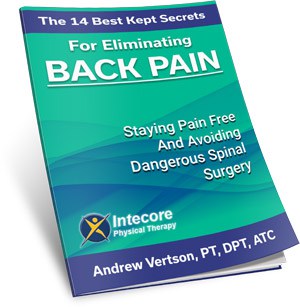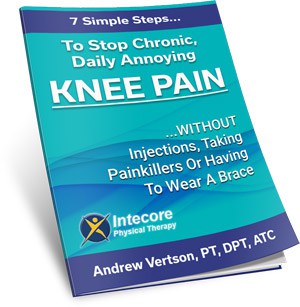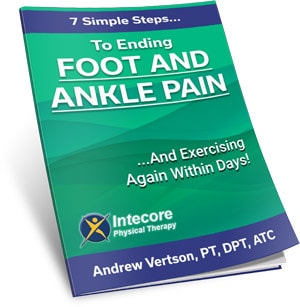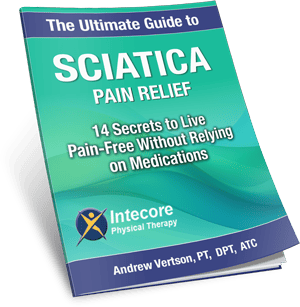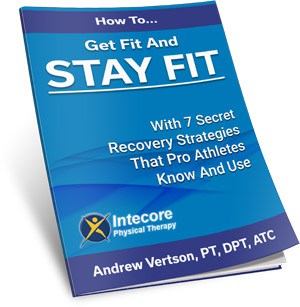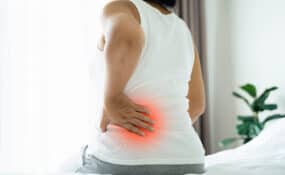
Do you ever wake up after a night of sleep with what feels like a totally immovable neck?
Stiff necks can be annoying and debilitating, preventing you from doing your normal activities and making your everyday life difficult. But don’t despair—although the causes of a stiff neck may seem mysterious, there is quite a lot we can do to prevent them and speed up your recovery if they occur.
If you regularly wake up in the morning with a stiff neck that won’t go away, no matter how much you stretch or massage it, or experience lingering neck pain after hours hunching over your laptop, you’ll know that as you try to move your head side-to-side, it almost seems your neck has turned to stone.
You cannot turn your head, and the pain is so severe that it keeps you from continuing throughout your day as usual. If this relates to you, the good news is that physical therapy can provide relief – allowing for better mobility and less pain.
More Blogs From Intecore
What Are Lumbar Support Braces, And Do I Need One?
What Is The Difference Between A Muscle Strain And A Sprain?
Can High-Intensity Workouts Be Good For Overall Health?
What Is A Stiff Neck, And What Causes It?

If your neck is bothering you now, you already know that a stiff neck can literally be a real pain in the neck. It’s a common condition that many of us experience at some point – occurring when pain and difficulty moving the neck muscles make it hard to turn the head or look sideways. But what causes it?
There are many possible causes for a stiff neck, from minor injuries to underlying medical conditions. Sleeping in a bad position, sitting in front of the computer for too long without good posture, or even stress and tension can also cause your neck muscles to stiffen up and become tight.
In more severe cases, a stiff neck could be a sign of a spine injury or arthritis. The cause is different for everyone. But understanding the causes of a stiff neck can help you take the necessary precautions and reduce unnecessary pain or discomfort.
Here at the most common reasons why you might have a stiff neck:
Medical conditions (diseases such as arthritis can cause a stiff neck due to inflammation and swelling):
These conditions can make the simplest movement quite challenging, from turning your head to nodding in agreement. And while a stiff neck is often associated with poor sleeping habits or a result of sleeping awkwardly, did you know that arthritis can also cause this discomfort?
Arthritis, characterized by inflammation and swelling, can irritate the nerves and muscles in your neck, leading to stiffness and pain. Although it’s not always possible to completely prevent neck stiffness caused by arthritis or other underlying medical conditions, staying physically active, practicing good posture, and managing your condition through physical therapy can help alleviate the discomfort.
Bad posture (slouching or sitting in an awkward position for too long):
Did you know that poor posture can significantly impact your overall health? Not only can slouching or sitting in an awkward position for too long lead to aches and pains and a stiff neck, but it can also affect your breathing, digestion, and mood.
Over time, poor posture can cause structural changes in your body, leading to long-term health issues. It may seem like a small thing, but sitting up straight and maintaining good posture can make a huge difference in how you feel physically and mentally.
So, the next time you find yourself hunching over your desk or slouching on the couch, take a moment to straighten up and give your body the support it needs. When working at a desk, make sure that your computer is positioned at eye level and your feet are flat on the floor.
Take regular breaks from sitting and stretch your back and neck regularly. Consider investing in an ergonomic chair supporting your back and relaxing your shoulders. Also, sleeping on your back with high-quality pillows helps to reduce the pressure on your spine and prevent misalignments and waking up with a stiff neck.

Stress (tension can cause tightness in the neck muscles):
Stress is inevitable, and we all experience it. However, the real problems start when stress causes physical discomfort in your body. For example, a common symptom of stress is tightness in the neck muscles.
It’s like someone is squeezing your neck from all sides, causing pain and discomfort. This sensation can be scary, but you can relieve it. Yoga, meditation, and stretching exercises (with a physical therapist) can all help reduce stress and tension in your neck muscles.
So, if you’re feeling stressed and your neck is bothering you, don’t let it take control of your life. Take a few moments to stretch, meditate, or practice Yin or Restorative yoga, and let the stress melt away.
Sleeping (on your stomach puts too much pressure on the cervical spine):
Sleeping on your stomach may be comfortable, but it can come with potential risks. One major issue is that it can put excessive pressure on your cervical spine/neck. This pressure leads to pain and discomfort and can even cause long-term damage to your neck.
Your neck supports the weight of your head, so it’s essential to take good care of it. If you’re a stomach sleeper, switch to a different position that doesn’t put as much strain on your neck.
Quality sleep is essential for overall health (especially in preventing chronic pain), so it’s worth ensuring you’re sleeping in a safe and healthy position. Good posture is vital for your overall physical health and well-being. Whether sitting at a desk or catching some Z’s, maintaining good posture is critical to prevent back pain, neck strain, and other unpleasant conditions.
Injury or trauma to your neck or shoulders (car accidents, sports injuries, etc.):
Neck and shoulder injuries can be incredibly painful and disruptive. The effects – like a stiff neck – can linger for months or even years, Whether from an auto accident, a bad fall, or a sports injury.
Simple tasks like reaching up to grab something from a high shelf or turning your head to look over your shoulder can become nearly impossible. Treatment for these types of injuries often involves pain management and physical therapy, and even surgery in severe cases.
Taking these injuries seriously and seeking medical attention if you have a persistent stiff neck after an injury is important to avoid long-term damage and discomfort.
Overuse of the neck muscles (from prolonged computer use, carrying heavy items):
Our necks are incredibly strong but can only handle so much strain, like any muscle. Unfortunately, in today’s world, our necks are constantly being pushed to their limits thanks to prolonged computer use, carrying heavy bags, and even just looking down at our phones for hours on end.
This overuse can lead to pain, stiffness, and even long-term damage if left unchecked. It’s important to take breaks, stretch, and be mindful of our posture to allow our neck muscles to rest and recover. Make it a priority and prevent neck pain before it begins.
Things You Can Do At Home To Relieve A Stiff Neck

Living with neck stiffness and soreness can be debilitating, and finding relief can seem challenging. Fortunately, you can use several pain relief techniques to reduce discomfort and improve mobility, reduce muscle tension, and promote relaxation. But the best news is you can do that from home.
We know that when you experience pain, sometimes the last thing you want to do is leave your home to go to a yoga or Pilates class. Luckily, you can do some exercises and other pain-relieving methods at home to alleviate some of your discomfort.
One of the most helpful things you can do is stretching. Gentle stretching can help release tension in the muscles in your neck and reduce pain. Another exercise you can do at home is yoga, which focuses on breathing and gentle movements to promote relaxation and reduce pain.
Cardiovascular exercises, such as walking or jogging on the spot, can also be beneficial as they release endorphins (your brain’s happy, pain-relieving chemicals) to help reduce pain. Heat and cold packs can also help reduce inflammation and promote healing.
While everyone’s experience with pain is unique, exploring different techniques can help you find the relief you need to live a more comfortable, pain-free life. Remember, though. It’s essential to listen to your body and not push yourself too hard. Stop if you feel more pain.
But incorporating these methods into your daily routine can make a big difference to neck stiffness. However, if the pain persists for over a week, please book a physical therapy consultation, so we can find and fix the cause.
How Physical Therapy Can Alleviate The Symptoms Of A Stiff Neck

A stiff neck can make simple tasks like turning your head or sleeping nearly impossible.
Luckily, physical therapy can be a game-changer when relieving these uncomfortable symptoms. A good physical therapist can target the underlying causes of your stiff neck, whether poor posture, muscle tension, or even an injury.
We work with you to develop a customized treatment plan that might include exercises, stretches, massages, and other techniques tailored to your needs. With time and dedication, physical therapy can have you feeling like yourself again, with no more stiffness in your neck to hold you back.
- How To Sleep with Sciatica and Back Pain - February 12, 2026
- Postpartum Joint Pain? 7 Fast Relief Tips for Busy New Moms. - February 3, 2026
- Sciatica or Piriformis Syndrome? 3 Ways to Tell the Difference (Self-Test Guide) - December 22, 2025





